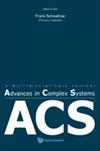Cooperation and the Globalization-Localization Dilemmas
IF 1
4区 数学
Q4 MATHEMATICS, INTERDISCIPLINARY APPLICATIONS
引用次数: 0
Abstract
Evolution of cooperation among self-interested agents is revisited in this paper in the context of globalization and localization. A globalized society is characterized by disentrenchment—or routine interactions between strangers across subcultures. Such interactions are rich in novelty, but also have high levels of distrust and insecurity. A localized society is comprised of clusters of subcultures where most social interactions happen. Each tightly knit subculture is rich in mutual familiarity and trust, but not conducive to the spread of novel ideas. A second dimension is that of utilitarian knowledge. Historically, social acquaintances were the primary (if not the only) source of utilitarian knowledge. With technologies like the internet, diffusion of utilitarian knowledge in a society is no longer modulated by acquaintance networks. This leads us to two different forms of (dis)entrenchment: (dis)entrenchment of knowledge and (dis)entrenchment of acquaintance, leading to four societal configurations. This paper asks how each of the configurations fares with respect to the evolution of cooperation. Entrenchment is represented using well-known network models from the literature, and evolution of cooperation is modeled by the evolutionary version of the iterated prisoners’ dilemma game. Based on simulation runs, we note that acquaintance and knowledge are characteristically different aspects. We find that disentrenched knowledge is more conducive for evolution of cooperation in networks rather than disentrenched acquaintances.合作与全球化-本土化困境
本文在全球化和本土化的背景下,重新探讨了自利主体间合作的演化。全球化社会的特点是跨亚文化的陌生人之间的疏离或常规互动。这样的互动充满新奇,但也有高度的不信任和不安全感。一个局部社会是由亚文化群组成的,大多数社会互动都发生在亚文化群中。每一种紧密结合的亚文化都充满了相互的熟悉和信任,但不利于新思想的传播。第二个维度是功利主义知识。从历史上看,社会熟人是功利主义知识的主要(如果不是唯一)来源。有了互联网这样的技术,社会中实用知识的传播不再受熟人网络的调节。这将我们引向两种不同形式的(dis)壕沟:
(dis)知识的壕沟和(dis)熟人的壕沟,导致四种社会结构。本文考察了每一种配置在合作演化方面的表现。堑壕是用文献中著名的网络模型来表示的,而合作的进化是用迭代囚徒困境博弈的进化版本来建模的。基于模拟运行,我们注意到熟人和知识是特征不同的方面。我们发现,去固化的知识比去固化的熟人更有利于网络合作的进化。
本文章由计算机程序翻译,如有差异,请以英文原文为准。
求助全文
约1分钟内获得全文
求助全文
来源期刊

Advances in Complex Systems
综合性期刊-数学跨学科应用
CiteScore
1.40
自引率
0.00%
发文量
121
审稿时长
6-12 weeks
期刊介绍:
Advances in Complex Systems aims to provide a unique medium of communication for multidisciplinary approaches, either empirical or theoretical, to the study of complex systems. The latter are seen as systems comprised of multiple interacting components, or agents. Nonlinear feedback processes, stochastic influences, specific conditions for the supply of energy, matter, or information may lead to the emergence of new system qualities on the macroscopic scale that cannot be reduced to the dynamics of the agents. Quantitative approaches to the dynamics of complex systems have to consider a broad range of concepts, from analytical tools, statistical methods and computer simulations to distributed problem solving, learning and adaptation. This is an interdisciplinary enterprise.
 求助内容:
求助内容: 应助结果提醒方式:
应助结果提醒方式:


